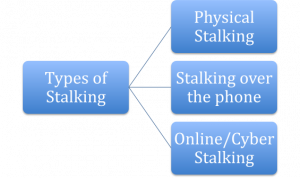[Trigger Warning: This explainer contains information on physical violence, sexual violence, abuse and slurs which some readers may find disturbing.]
If a person repeatedly follows, contacts or monitors someone despite their disinterest or lack of consent, it is known as stalking. Stalking is a term used for numerous activities done by a person, which when taken together can disrupt the life of the survivor.(( Section 354D, Indian Penal Code, 1860.)) Under the law, only a man can be punished for the crime.

Stalking can happen in close proximity physically or over the phone or even online. The crime of stalking is:
- Repetitive in nature and is consistent.(( State v. Sh. Abhimanyu, District Court, (Special Judge, CBI) Delhi (2018) CA No.18/15.))
For example, if a person sends love letters every day to someone, despite their disinterest.
- Causes trauma by making someone feel uncomfortable, harassed, tortured, or intimidated. This can be physical, emotional or psychological.(( Report of the Committee on Amendments to Criminal Law, Justice Verma Committee (2013) accessed at https://www.prsindia.org/uploads/media/Justice%20verma%20committee/js%20verma%20committe%20report.pdf.))
For example, if flowers are repeatedly sent to a person’s office by someone and this makes them the subject of ridicule at the office.
- It is an invasion of personal space.
For example, if someone is followed every day to their place of work.
- Attempting to establish a relationship or personal contact with someone without their consent.
For example, if someone sends multiple WhatsApp messages hoping for a reply.
The punishment for online stalking is jail time up to three years along with a fine. For repeat offenders, the punishment is higher, i.e. up to five years jail time along with a fine.(( Section 354D, Indian Penal Code, 1860.))

